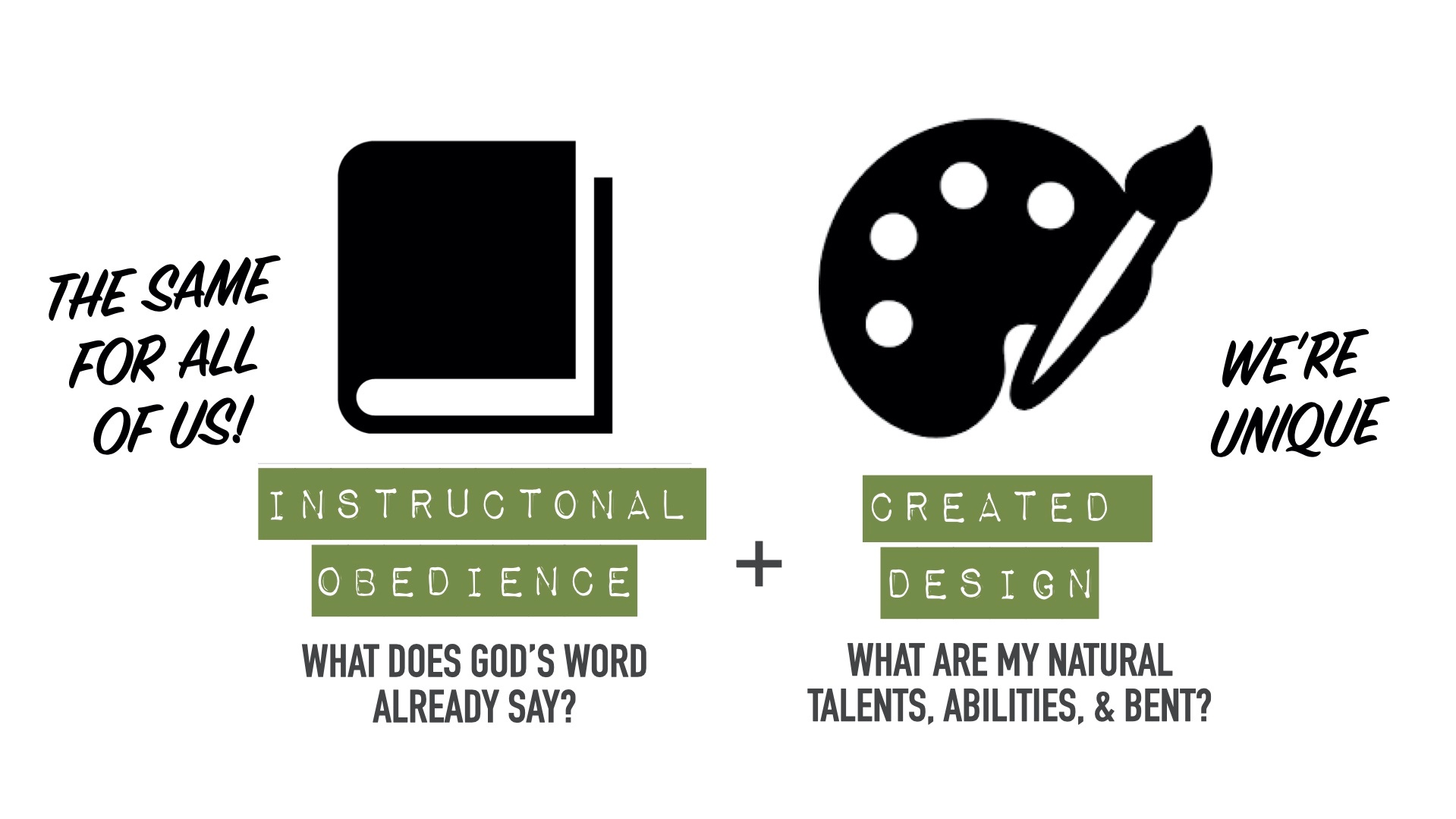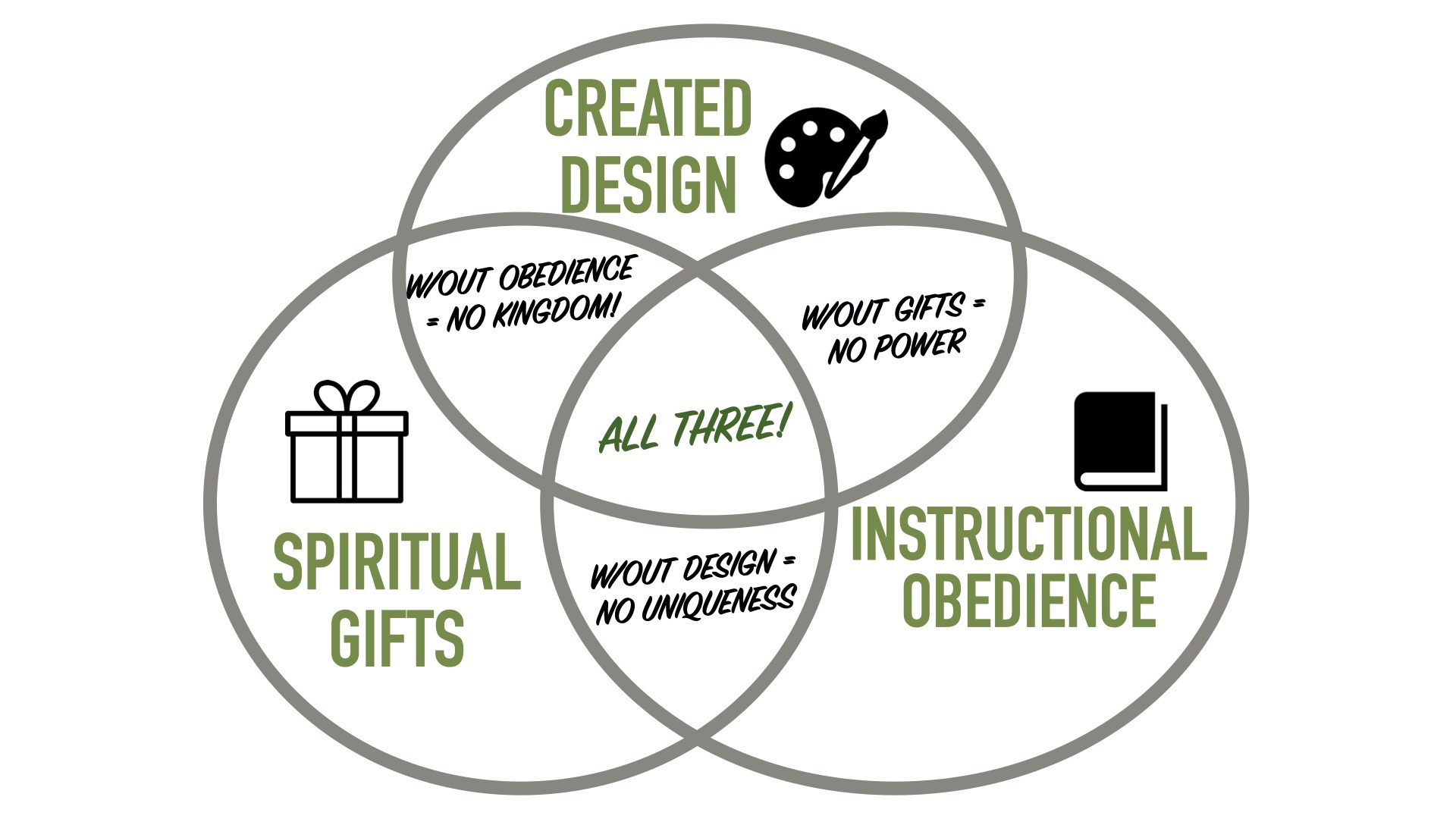The Personal Reflection Questions Assessment Explained
From LifeLift Assessment C
The LifeLift framework pulls together three foundational areas in order to help you find + fulfill your purpose..
We’ll talk about the following:
- Instructional obedience = look at what God has already said and do it
- Natural talents + created design = lean into the areas that are unique about you
- Supernatural gifts = embrace the Holy Spirit’s expression through you
These are our three guidelines to discovery-- all of which we outline in lesson 18 of the video course / workshop.
Where Assessment C fits into the framework
Assessment C invites you to reflect on on the first two foundational areas.
Notice, the areas of Instructional Obedience, for the most part, are the same for each of us.
Then, our Created Design is where we begin looking different... because of how we were intentionally made by God.

The first two questions
As we look at areas of instructional obedience— places where our faith remains unseen— there are two predominant questions we should ask ourselves.
Question #1: Is there an area in your life that you are afraid will “catch up” with you?
If anyone knew about secret sins and hoping duplicity wouldn’t catch up, it was Solomon. We discussed his plight in chapter 11.
Solomon tells us, “The righteous are as bold as a lion” (Proverbs 28:1).
I’ve hidden sins in the past. When I did, I was always afraid they would surface.
True freedom comes not in making certain nothing leaks but, rather, in living in such a way that there’s nothing more to hide.
When we hide parts of our lives, things seem fragile. We live in fear of expressing who we really are, of allowing the gifts to overflow. We’re, in some sense, afraid we’ll be “found out.”
The solution?
In the same way Peter did, leave it behind and live from who you really are— as the person Christ has already called you.
Question #2: Are you harboring any areas of bitterness, jealousy, or envy?
Unforgiveness not only hinders the flow of the Holy Spirit through us, it also clouds how we view others. And that haze isn’t limited to the person against whom we harbor offense.
The author of Hebrews tells us that we should beware of all bitter roots. The implication is that these roots, left unchecked, drive deep. Then, they sprout and defile not just one but many (see Hebrews 12:15).
Remember...
Here’s one of the biggest reason the “instructional obedience” issue is foundational: spiritual gifts don’t guarantee we’ll act with maturity. Remember, even Judas laid hands on sick people— and they recovered. He cast out demons. Yet he also betrayed Jesus.
The graphic below shows us that if if doesn’t fall in the bounds of instructional obedience, it falls outside of the bounds of the Kingdom.

The next two...
After reviewing areas of instructional obedience, take a look at your created design. Whereas the areas of instructional obedience are incredibly similar for all of us, our created design is where we begin expressing more of our individuality.
There are two additional questions which can help drive your process of discovery in this area, too...
Question #3: What is something you do better than others, something you may have always done?
I’ve always talked and taught. It’s taken various forms, but it’s a common thread. Like I mentioned earlier in the book, when I was in high school, I helped teach other guys on the wrestling team how to better execute their moves. When I was in college, I helped write and create our group presentations. Now, I write and teach at live events, through online courses, podcasts, and books. It’s a natural overflow of who I am and always has been— even before I was saved.
My Dad has always led. His elementary teammates chose him as the captain of their teams, his high school peers elected him to lead their student organizations, and then he led several churches. For a decade he oversaw the Office of Leadership and Church Growth for the Baptists in Alabama. After retiring, churches continued calling him for his leadership expertise. Leadership has always been part of who he is— even before he was saved.
In chapter 14 we discussed created design and the created gifts: prophecy, service, teaching, exhorting, giving, leading, and mercy. There’s probably one or two that you’ve naturally expressed your entire life. Identifying these areas is part of discovering how the Holy Spirit expresses Himself through you.
Noticing the areas where "better than average" comes naturally to you provides clues as to how God might want to use you. After all, He's the One who designed you with those abilities.
Question #4: What burden do you feel?
Or, “What’s on your heart?”
Sure, ministry sometimes involves doing things we don't like to do. I understand that.
At the same time, Scripture tells us that we should delight ourselves in the Lord and He’ll grant us the desires of our heart (Psalm 37:4). As we align with Him and His agenda, our hearts mesh with His. As such, He places those desires— those dreams— inside us.
There’s something you see that very few other people see. It may be a specific cause, an idea that needs to be taught, or some sort of ministry you want to see implemented. It’s something the Lord has highlighted to you, part of your unique contribution to this world.
In the video I discuss the stories of Nehemiah and Moses-- both of whom saw opportunities (and issues) others overlooked.
In the same way, there's something you see...
... and it may be that God has give you supernatural eyes to see that very area.

Your natural talents and created design are part of the way the Lord has uniquely made you. In the same way that your purpose will probably fall within the bounds of instructional obedience, the ministry you do will also fall somewhere in the bounds of God's created design.
Working through these two foundational levels— instructional obedience and created design + natural talents— then enables us to move towards the area of our spiritual giftedness in a healthy way.
Notice what happens when we put it together...
Notice that without Instructional Obedience, our actions all out of bound of the Kingdom of God.
And apart from acknowledging our Created Design, our activities cease to celebrate the unique form God intentionally gives each of us.
Of course, apart from utilizing our Spiritual Gifts, we negate the supernatural power God invitees us to lean into, the power that raised Jesus from the dead and now fuels us to perform at a level that far exceeds our natural capacity.
Each of these areas are important. Furthermore, they're synergistic-- that is, the "result" of them working together is greater than the mere "sum of the three parts."

You're next steps
Follow the first link below to watch all of lesson 18, or explore other options provided here for you.







